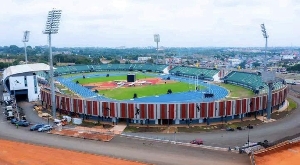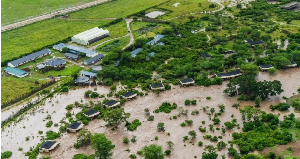- Home - News
- TWI News | TV
- Polls
- Year In Review
- News Archive
- Crime & Punishment
- Politics
- Regional
- Editorial
- Health
- Ghanaians Abroad
- Tabloid
- Africa
- Religion
- Election 2020
- Coronavirus
- News Videos | TV
- Photo Archives
- News Headlines
- Press Release
General News of Friday, 22 June 2007
Source: GNA
EC/UNICEF water and sanitation project launched
Tamale, June 22, GNA - Alhaji Mustapha Ali Idris, the Northern Regional Minister, has launched the European Commission (EC) and United Nations Children's Fund (UNICEF) Water and Sanitation Project aimed at reducing guinea worm in the Northern Region. The EC and UNICEF jointly funded the Project known as "The integrated approach to guinea worm eradication, through water supply, sanitation and hygiene in Northern Ghana".
The EC is contributing 14.5 million Euros, while UNICEF, the implementing agency is providing 5.05 million Euros. The objective of the project is to contribute to an improvement in family health status and quality of life of the population in a highly guinea worm endemic districts in northern Ghana. The project specifically targets nine of the top guinea worm endemic districts, which are Savelugu/Nanton, Tolon/kumbungu, Nanumba North, Gushiegu, Central Gonja, Karaga and Zabzugu/Tatale and aims at reducing the disease there by 90 per cent.
It is expected that under the project, access to safe drinking water would be improved with the provision of about 270 boreholes, 80 rehabilitated boreholes, 20 dug wells, 60 mechanised systems and 30 alternative water systems.
Basic sanitation delivery and coverage were also expected to increase with the construction of 48,000 latrines and improved hygiene behaviour practices with focus on hand washing.
Alhaji Idris said in spite of the impressive progress made by the Guinea Worm Eradication Programmed, its complete eradication had continued to be a challenge because the pace of development of potable water supply for the communities had always lagged behind. He said in 2004, the national coverage of safe water and sanitation was estimated at 52 per cent and 54 per cent respectively. The country's aim is to increase coverage in rural areas and small towns to 73 per cent for safe water and 65 per cent for sanitation by 2015.
However, he said, in the Northern Region, safe water and sanitation coverage in 2004 for the rural communities and small towns was estimated to be 45 per cent and 17 per cent respectively. Alhaji Idris said it was therefore not surprising that the guinea worm disease continues to be a problem in nearly all the 18 districts of the region and increasing the risk of infection. For example in 2005, 313 former endemic villages became re-infected.
He said the success of the current project depended on the cooperation of all stakeholders especially District Chief Executives. Alhaji Idris called for transparency and accountability in all the administrative and financial procedures of the project to ensure that all those communities engaged now are provided with safe water and sanitation facilities.










